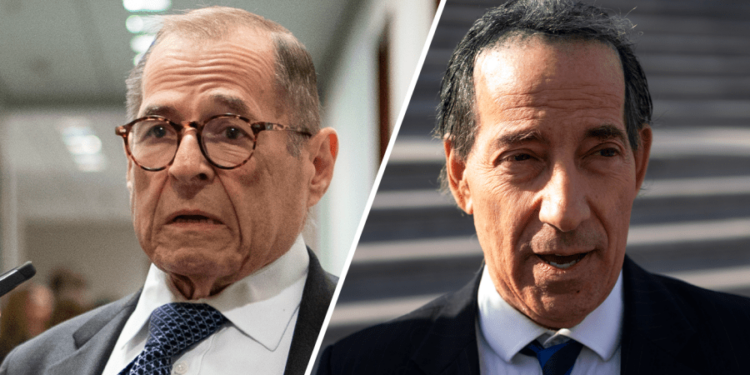
The Democratic battle for the top spot on the House Judiciary Committee is heating up as Congress returns this week to Washington, where Rep. Jamie Raskin (D-Md.) is challenging Rep. Jerrold Nadler (D-N.Y.) to be the face of resistance to the second Trump presidency.
The race has obvious practical implications, as the Judiciary panel has vast jurisdiction over the federal courts and law enforcement agencies, including the FBI, where Democrats fear Trump will abuse his powers to target political opponents.
It’s also the panel where impeachment investigations tend to launch, and Nadler and Raskin — both constitutional lawyers who played outsized roles in impeaching Trump during his first term — likely see an opportunity to build on that legacy if Democrats flip control of the House in the 2026 midterms.
With those high-stakes at play, the race could get ugly.
“I think it’s unfortunate,” Nadler told The Hill when asked about Raskin’s bid. “He’s already ranking on a different committee, which is a very important committee.”
Beyond a mere roster change, however, the contest also bears a heavy symbolic significance for House Democrats, who have a long history of honoring seniority when it comes to choosing top committee seats. In a typical year, that would favor Nadler, 77, a 34-year veteran of Capitol Hill hailing from a powerful Manhattan district. And some Democrats are already questioning Raskin’s decision to challenge the long-serving liberal stalwart.
“I don’t really like the idea of — kind of like a barracuda, cruising around the pool looking to consume smaller fish,” said one Democratic lawmaker, who spoke anonymously to discuss the sensitive topic. “That’s not to say that Jerry is a smaller fish than Jamie. But it’s kind of like a predatory situation.”
But this is no typical political year.
President Biden was forced to drop off of the presidential ballot over concerns about his age. Two other Democratic committee heads, outside of Nadler, have also faced challenges from less senior members. And a younger cohort of Democratic lawmakers seem increasingly eager to challenge tradition and expedite the generational turnover that’s been slow to emerge under the current conventions of seniority.
“It’s not a lack of confidence [in Nadler]. It’s a fire in the belly thing,” said a second Democratic lawmaker, touting Raskin. “I think he has the votes. I think he’s going to do it.”
That clamor not only lends a boost to Raskin, 61, an eight-year veteran, but also threatens to upend a core custom at the heart of the Democrats’ governing structure — a change that could have far-reaching implications for both the legislative direction and the public face of the party for years to come.
Some lawmakers — especially newcomers on Capitol Hill — are unbothered by that departure in tradition.
“I have total respect for seniority,” said Rep. Madeleine Dean (D-Pa.), a Judiciary Committee member who has served in the House since 2019. “But maybe because I’m one of the newer people, not quite so young, but one of the newer people, that I’m not so absolutely dreaded that seniority is the only barometer.”
Others aren’t so sure.
Rep. Hank Johnson (D-Ga.), a member of the Judiciary Committee, suggested the seniority system has worked well, and shouldn’t be abandoned simply for the sake of a generational shift.
“That may be an argument for some, but the fact of the matter is that we still have the rule of seniority in place,” said Johnson, who is also a member of the Congressional Black Caucus that has long defended the seniority system.
“I’m certainly open to discussing whether or not we, at some point in the future, move to another way of selecting leadership,” he continued. “But right now, seniority is the rule. And I’ve always gone with the rule unless there’s a compelling reason to disregard the rule and move in a different direction.”
Raskin’s decision to jump into the Judiciary ranking member race — which he announced in a letter to colleagues on Monday — came after weeks of speculation surrounding whether or not he would make the leap from the top job on the Oversight and Accountability Committee.
Several outlets reported that some Democrats were pushing Raskin to challenge Nadler — including former Speaker Nancy Pelosi (D-Calif.) — seeing the younger, more refined Marylander as optimal to the brash, septuagenarian New Yorker. That sparked some tensions within the caucus.
“This is people encouraging Jamie to run for this seat to settle old scores against Nadler,” said the first Democratic lawmaker.
Raskin said he came to a conclusion “after a week of consulting most of our Colleagues and engaging in serious introspection about where we are,” before citing “new generations” of leaders — a veiled nod to his competition, and a sign that age was one of his motivations in running.
On Tuesday, Raskin downplayed any lingering tensions between the two while also emphasizing that he’s still barreling ahead with his challenge.
“Obviously I’ve got great affection and admiration for Congressman Nadler and everything he’s done over an amazing career,” Raskin said.
“I’m working to get the votes,” he added. We’re having a great conversation in the caucus about where things are headed.”
If Raskin is using his young age as an advantage, however, Nadler is referencing his decades of experience — which include seven years as the top Democrat on the Judiciary Committee — as an asset in his quest to hold the leadership post.
“As a New Yorker, I have stood up to Donald Trump my entire career,” Nadler wrote in his letter to colleagues last month.
Nadler told The Hill that he is “of course” continuing with his bid, adding that Raskin is “entitled to run.” Despite the challenge, he said he’s confident he’ll keep the seat.
“I think we’re gonna be okay.”





